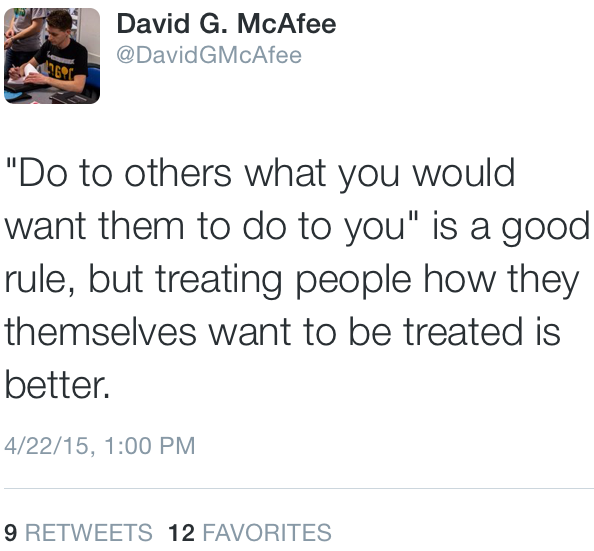
A friend on Facebook shared this comment. The idea behind it seems self-evident: shouldn’t you evaluate your actions with respect to others based on how they themselves perceive those actions? If you like vanilla more than chocolate, then it doesn’t make sense to give everyone vanilla. You should find out which they prefer themselves, and you should behave accordingly. Simple, right?
Well, no. It’s not always that simple. The reason that analogy works is precisely because taste really is subjective. But, unless you’re willing to buy into total moral relativism, then that analogy is not going to translate simply and easily from dishing out ice cream to much more complex issues ranging from helping people kill themselves (assisted suicide) to helping people mutilate themselves (see: Bodily Integrity Disorder).
By the way, I had to look up David G. McAfee (who wrote the original Tweet). If you did not know who he was, then the best way to introduce him is as a sidekick to the Four Horsemen of the Non-Apocalypse. Which is to say, he’s the newest generation of the New Atheist movement. I particularly enjoyed the titles of his books: Disproving Christianity and Other Secular Writings and Mom, Dad, I’m an Atheist: The Guide to Coming out as a Non-Believer. There are few things as endearing as the towering sense of certainty that accompanies precious young adulthood. Whether it’s fundamentalist Christians who know that they can prove God exists or fundamentalist atheists who know they can prove God doesn’t exist, you just kind of want to ruffle their hair and say, “That’s the spirit, Sport. Go get ’em.”[ref]Also, I love that his book titles sound kine of like Oolon Colluphid’s (fictional) trilogy: Where God Went Wrong, Some More of God’s Greatest Mistakes, and Who is this God Person Anyway? From Douglas Adams’ Hitchiker’s Guide to the Universe series.[/ref]
This clash between the directive to just “be nice” (which entails a kind of moral relativism) and the apparent callousness of traditional morality (which stems from moral objectivism or realism) is incredibly important. It constitutes an essential aspect of the clash between social conservatives and social liberals. Pick any one of several issues and you will find at root a conflict over moral relativism masquerading as a conflict over self-determination. One example is the right-to-die movement, which argues that denying legalized, physician-assisted suicide is a gross abridgment of the right of rational human beings to choose the timing, manner, and rationale of their own demise. The same sentiment pervades most of the sexual philosophy of modern liberalism: as long as people are consenting adults, what right have we to abridge their choices with either legal or moral condemnation?
The logic is strong and compelling because it taps into a bedrock principle of the philosophy that our nation was founded on. What is more American or more Enlightened than to staunchly defend the right of citizens to choose their own identities and destinies?
And yet, as even some liberals have started to intuit, this logic takes us in unintended directions. Damon Linker is one who has had the temerity to draw attention to this point. In “Yes, the Libertarian Moment has Arrived” he argued that “America clearly is becoming more libertarian — it’s just that the transformation is happening in morality and culture, not in economic, tax, and regulatory policy.” Linker traces this shift to Anthony Kennedy’s decision on Planned Parenthood v. Casey, in which he wrote that “At the heart of liberty is the right to define one’s own concept of existence, of meaning, of the universe, of the mystery of human life.” Scalia, as prescient as he is grumpy, “recognized immediately that such a libertarian principle created serious problems for morals legislation of any kind.”
The problem with Kennedy’s logic is that it has no limiting principle. And the problem with that is that it leads to places that make us uncomfortable. Which is why Linker is one of the few (maybe the only?) social liberal to publicly connect the dots between socially liberal positions that are in and socially liberal positions that are (so far) still very much out.[ref]That last sentence works best if you imagine Heidi Klum saying it the way she does in Project Runway.[/ref] This irritates his fellow liberals to no end, as he wrote about in “No, I’m not the Rick Santorum of punditry“:
Why, these readers wonder, do I continually highlight such trends as the acceptance of homosexuality and same-sex marriage, polyandry, the mainstreaming of porn, consensual brother-sister incest, and bestiality, while also insinuating that they’re all somehow connected? In doing so, aren’t I invoking the same kind of alarmist and fallacious slippery-slope arguments favored by social conservatives — and in particular by the wannabe savior and champion of the religious right Rick Santorum, who seemed to imply back in 2003 that legalizing same-sex marriage might lead to the acceptance of “man on dog” relationships?
Linker disavowed the slippery-slope argument, and this is reasonable. To the extent that the slippery slope argument functions as a rhetorical device to transfer disgust from bestiality to homosexuality it is morally and logically deficient. The two are in no way equivalent, the one does not lead to the other, and given those two facts sloppy conflation of the two leads to justifiable outrage that drowns out a more legitimate—and more subtle—argument. It’s not that gay marriage itself implies anything else on Linker’s list. It’s that they are all implied by a common cause.
To explain this common cause, Linker cites social psychologist Jonathan Haidt’s Moral Foundations Theory (MFT). According to this theory, there are six universal moral value-opposite pairs: care/harm, fairness/cheating, liberty/oppression, loyalty/betrayal, authority/subversion, and sanctity/degradation. Haidt has discovered that while conservatives in America incorporate all six pairs into their moral paradigms, liberals in America acknowledge exclusively the first three.
Linker focuses on just the first pair (care/harm), writing that in the West “within the past few decades… the concern for care/harm — with both care and harm defined exclusively in terms of individual preferences and desires — begun to drive out other moral principles.” As a result:
Outside of the relatively narrow sphere of the law, this shift isn’t taking the form of a slide down a slippery slope, as if the acceptance of homosexuality were causing or leading to the acceptance of other sexual behaviors that were once considered deviant. Rather, the public condemnation of all such behaviors is slowly fading away because of an underlying ethical shift that has transformed care/harm into the ultimate moral trump card.
The liberal paradigm, rooted in myopic attention to care/harm, is the common cause that leads to, for instance, acceptance of gay marriage and of group marriage. To the extent that gay marriage is accepted (legally and morally) on these grounds, it validates the care/harm paradigm and that validation (not gay marriage itself) will inevitably lead to group marriage. It is also vital to note that it is not just the emphasis on care/harm but also, as Linker pointed out, care/harm “defined exclusively in terms of individual preferences and desires.” In other words: while everyone is off debating about self-determination and individual human dignity, the actual payload of these arguments is to sneak moral relativism in while no one is paying attention.
So this is why McAfee’s quote matters so much. At first it seems like just a pedantic reformulation of the Golden Rule. But the point of Christ’s injunction was to broaden the scope of morality. Instead of behaving morally within our clan or tribe, our moral obligations became universal. That was the primary point he was making, as the following parable illustrates quite clearly. McAfee has not only missed the point, but he is using an apparently trivial twist to do something entirely different; he is redefining morality. The new formulation substitutes subjectivism and sentimentalism in place of moral realism.
The problem, for Linker at least, arises when that same paradigm leads not only to validating polyamory in group marriages (for example), but also extends to behaviors that still trigger to disgust in most people. Linker writers:
That’s why the recent 6,200-word New York magazine interview with a committed “zoophile” is so important — because it’s such a perfect example of this transformation and its practical implications. The piece expressed no concern about the subject’s moral degradation and in fact contained no moral judgments at all — except to denounce those who would make such judgments. And why is it wrong to judge a man harshly for having sex with a horse? Simply because, the interview clearly implied, it would be mean (and so harmful) to those who have such desires.
Which leads Linker to his most important question:
Don’t get me wrong: being nice is definitely a good thing. But is it the best thing? The highest thing? The thing that should override every other possible moral judgment? I’m not so sure.
Linker is in search of some kind of limiting principle. He understands (and so do most social liberals, which is why they get so testy about it) that within the new moral paradigm there isn’t one. The only thing that separates acceptance of homosexuality on the one hand and consensual sibling incest on the other hand is popularity. Which is to say, fashion. That’s it. There’s no substantive argument possible within the exclusive care/harm paradigm to admit the one but deny the other. And so social liberals are confronted with a stark question. Do they fully embrace the logic of their paradigm and concede that their own disgust at zoophilia, incest, and so forth are nothing more than newly exposed forms of bigotry? Or do they reject the logic of their moral paradigm and look elsewhere to arrest the unfolding progress of moral progressivism?
 Today was my day for another post at Times and Seasons. This time, I went for a very, very short post about the connection between suffering and empathy, with a little help from neuroscience, my favorite band (Thrice), and quotes from the books of Alma and Matthew. The message: Every Scar is a Bridge to Someone’s Broken Heart.[ref]Lyrics from the Thrice song, “For Miles” off of their Vheissu album.[/ref]
Today was my day for another post at Times and Seasons. This time, I went for a very, very short post about the connection between suffering and empathy, with a little help from neuroscience, my favorite band (Thrice), and quotes from the books of Alma and Matthew. The message: Every Scar is a Bridge to Someone’s Broken Heart.[ref]Lyrics from the Thrice song, “For Miles” off of their Vheissu album.[/ref]
 Over at
Over at 





